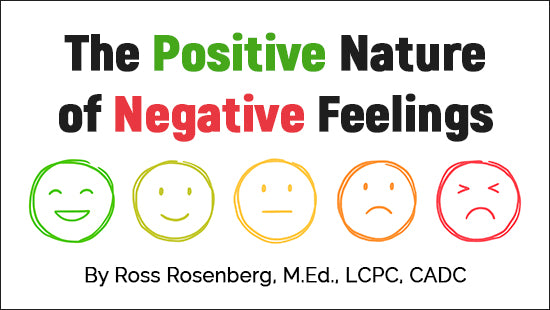
Written by Ross Rosenberg, M.Ed., LCPC, CADC
Self-Love Recovery Institute – President/CEO
Psychotherapist, Educator, Author, Expert Witness
Feelings describe our emotional reactions to the events, people, and conditions we experience in our lives. Every feeling we experience is real, whether the experiences that preceded them were real, exaggerated, or distorted. Before I proceed with further explanations of feelings, it is important first to address the common misunderstanding that it is the same or synonymous with “emotions.”
Emotions are biological/physical reactions to either external or internal events that are first processed by the brain and subsequently experienced (in milliseconds) as bodily sensations. Emotions are considered factual, as they can be observed and measured. In mentally healthy individuals, they are recognized in real-time. In contrast, people suffering from mental health problems such as Posttraumatic Stress Disorder (PTSD) can be magnified, muted, or not even recognized.
A feeling is a person’s internal (thoughts) and external (spoken words) representation of the body-based emotion. Because of complicated psychological mechanics, feelings may be muted, denied, suppressed, or even repressed/dissociated from a person’s awareness. Feelings are subjective interpretations of emotions that are assigned to qualifying and quantifying terms. Emotions can be quantitatively observed with or without a description of them. In other words, an emotion can be observed and quantified on medical instruments, while feelings are far more variable and subjectively understood. According to R. Allyn, 2022:
Let’s look at a couple of examples: You notice the emotion of discomfort while at a party as your stomach clenches and your breathing gets constricted. Then your mind labels that as feeling awkward because perhaps you don’t know many people there, or you just saw an ex-boyfriend. Yet another person with those same emotional bodily sensations, however, might label the experience as exciting because they get to meet new people or see their ex again.
Our feelings are distinctly unique and important to our evolution as a species. Without the ability to be emotional and to have feelings, we would not have adapted to the complicated environmental, cultural, historical, and social challenges that carved out our evolutionary path—being able to have feelings is directly related to the “progression” of our humankind.
Think about it: it is because the English Puritans experienced emotions that were expressed as feelings of anger, resentment, and humiliation; because of the King of England’s treatment of them, they eventually landed or, to some, occupied the land that would eventually be named the United States of America. In contrast, if these Puritans did not express or either denied such feelings, their combined mental health and subsequent personal, social, and familial safety would be jeopardized. In this case, the “face” of America would be very different.
In most instances, feelings fall into distinctly separate categories: “positive” and “negative.” “Positive” feelings result in “feel good” moments, i.e., happiness, gratefulness, hopefulness, excitement, etc. “Negative” feelings result in uncomfortable and negative subjective experiences, i.e., anger, loneliness, sadness, fear, etc. Neutral or “middle of the road” feelings are neither positive nor negative expressions. Examples include being concerned, curious, challenged, etc.
The positive or mentally healthy response to negative emotions–those that are uncomfortable, or painful–is healthily managed by reflexive, accurate, and honest (lacking denial) internal processes in real-time. Conversely, the unhealthy, dysfunctional, or pathological responses to negative feelings are managed by equally reflexive reactions. The primary difference is that they are often inaccurate, distorted, denied, suppressed, or repressed/dissociated, which results in or contributes to one’s mental health challenges.
Although a person might believe such reactions provide relief, they are potent indicators of underlying mental health concerns. Therefore, the quality of one’s management of emotions requires the necessity to seek an accurate subjective understanding of them and, if necessary, to communicate them accurately. Like it or not, how we feel can indicate solid mental health or a potent red flag for underlying concerns.
Just because “positive” feelings feel good does not necessarily mean that the “negative” feelings are not good for us. Although negative feelings create negative emotional states, they are essential to the positive mental health of all people. Human beings are biologically designed to experience a complete range of all possible feelings (emotions). We are born as a “blank slate” with the potential to develop a full array of emotional abilities. Through environmental, cultural, societal, and familial conditioning, we learn about our feelings, which are and are not valued, and the rules to manage them.
Positive feelings don’t create positive mental health; instead, by understanding why we feel a certain emotion/feeling, understanding what it represents, and deciding what, if anything, we should do about it. Living honestly with one’s feelings is more important than the actual quality of the feelings. Therefore, experiencing negative emotions is substantially healthier than suppressing or denying them. Conversely, pretending to feel positive emotions when you feel negative emotions is unhealthy.
A myriad of factors determines how we experience and manage our feelings. Personality type, mental health, physical health, cultural background, and various personal and social issues affect our emotional experience. To illustrate, a person who gets a surprise promotion may react with happiness and excitement. Another person might feel anxious, burdened, and afraid, but hide those feelings for fear of consequences. With this promotion, one person would move forward in their career, and the other group may stall, stumble, and even fail. Clearly, the range of feelings for a given event and the likely reactions to those feelings differ among people.
People suffering from codependency, or what is now referred to as Self-Love Deficit Disorder™, have a narcissistic and codependent parent who subjected them to early (childhood) attachment trauma. They were taught that “positive” feelings, whether or not accurate, are preferred and therefore acceptable, while “negative” feelings are to be attributed to anyone but the narcissist or hidden, denied and ultimately repressed.
In these highly dysfunctional families, a child who communicates or demonstrates anger, fear, anxiety, or resentment, to name just a few negative emotions, will likely activate a narcissistic injury and be subjected to punitive harm, neglect, or abandonment. Therefore, this child learns that expressing and even admitting such feelings indicates something is shamefully wrong with them. For the child who can keep from the narcissist’s crosshairs, they survive by hiding, denying, or dissociating from these feelings.
The message is clear: “Good” children only feel and express positive feelings, and “bad” children feel and express negative feelings. These children eventually become adults who have been conditioned to filter their feelings through a maze of distorted rules. Breaking these rules threatens the cohesiveness and perceived safety of these dysfunctional families. Consequently, the children of these families become adults who are likely to have suffered attachment trauma, which is the root cause of SLDD/codependency.
To illustrate the importance of living honestly with one’s feelings, one should consider the importance of the feeling of anger. Anger is one of a handful of basic feelings we humans are biologically designed to experience. To feel anger is as natural and normal as it is to feel happy. Anger, the “negative” feeling, and happiness, the “positive” feeling, are merely reactions to one’s environment. When we disregard our normal reactions, we deprive ourselves of our real and individual experiences.
Believe it or not, the human mind has distinct “physical” properties. Denying, suppressing, or even repressing negative feelings (emotions), goes against human nature. For humans, evolution did not give them an innate ability to stuff or repress feelings. As simple as it sounds, what goes in stays in, at least until it is acknowledged, accepted, and/or expressed. Just because we do not think or remember negative feelings does not mean they go away.
Unacknowledged and/or unexpressed (stuffed) feelings accumulate. They stay dormant until expressed, understood, and eventually accepted, like air pressure locked into a glass bottle. The more air we pump into this bottle, the more we create an eventuality that the bottle will explode. The mind, like the bottle, has a “breaking point,” when a person feels “shattered,” out of control, afraid, ashamed, and unsure about what happened and how to put the pieces back together.
In conclusion, some people may find understanding, managing, and healthily expressing feelings difficult or even impossible. But suppose one desires to escape the jail-like confines of their mind that chronically prevents them from accurately experiencing and understanding their emotions and feelings. In that case, they should seek professional help. The fact is, experiencing richer, more satisfying, and ultimately healthier relationships requires healthy emotional and feeling management. So don’t wait too long to find your path. Get help if necessary.
Ross Rosenberg M.Ed., LCPC, CADC, is Self-Love Recovery Institute’s CEO and primary contributor. His internationally recognized expertise includes pathological narcissism, narcissistic abuse, and attachment trauma. Ross’s “Codependency Cure™ Treatment Program provides innovative and results-oriented treatment.
Ross's expert educational and inspirational seminars have earned him international acclaim, including his 23 million YouTube video views and 236K subscribers. In addition to being featured on national TV and radio, his “Human Magnet Syndrome” books sold over 150K copies and are published in 12 languages. Ross provides expert testimony/witness services.
More about Ross and his educational and inspirational work can be found at www.SelfLoveRecovery.com.
Join us on Facebook, Instagram, Twitter, and now TikTok!
https://www.facebook.com/TheCodependencyCure
https://www.instagram.com/rossrosenberg_slri
https://www.twitter.com/rossrosenberg1
https://www.tiktok.com/@rossrosenberg1


0 comments